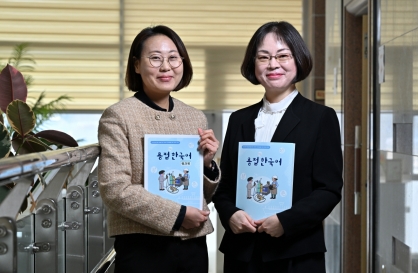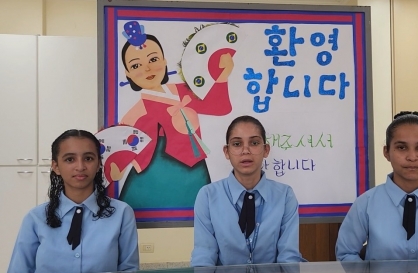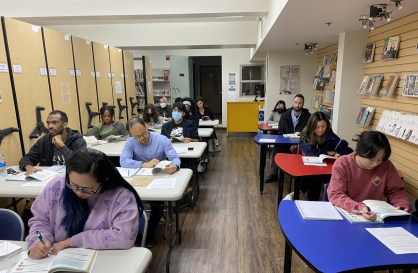Most Popular
Hello Hangeul
-
1
Welding book first in vocational Korean series for foreign labor

-
2
[Korea Beyond Korea] In Sao Paulo, horizons expand for Korean studies
![[Korea Beyond Korea] In Sao Paulo, horizons expand for Korean studies](//res.heraldm.com/phpwas/restmb_idxmake.php?idx=644&simg=/content/image/2023/11/20/20231120000619_0.jpg&u=20231206104853)
-
3
In Brasilia, worldly dreams are born from Korean classes

-
4
Americans seeking to visit Korea learn the language in LA

-
5
[Korea Beyond Korea] Berlin, Europe's Korean Studies hub, nurtures next-gen experts, scholars
![[Korea Beyond Korea] Berlin, Europe's Korean Studies hub, nurtures next-gen experts, scholars](//res.heraldm.com/phpwas/restmb_idxmake.php?idx=644&simg=/content/image/2023/10/18/20231018000929_0.jpg&u=20231023154735)
[Hello Hangeul] Love for Hangeul grows in corner of Sweden
Popularity of K-dramas and K-food drives demand for Korean language learning
By Jung Min-kyungPublished : Oct. 21, 2023 - 16:01

GOTHENBURG, Sweden -- It’s 6 p.m. on a regular Thursday in Sweden’s second-largest city of Gothenburg. Seventeen students of various ages gathered in classrooms at a high school to learn a language that is spoken in a distant land: Korean.
They are the enrollees of a Korean language course offered at a branch of the King Sejong Institute, the Korean government-run language education center. The KSI Gothenburg is one of the center’s 248 branches worldwide and the only one in Sweden.
“The classes have become such a big part of my life,” Lizzie Kullander, 52, who studies at an advanced-level class, told The Korea Herald on Sept. 21.
She added with excitement that she and her classmates were going to check out a new Korean hot dog vendor in town after class.
“The best part about learning Korean is actually the classes themselves and the people in them,” she added.

Laying the cornerstones
Sweden discovered the charm of Korean culture later compared to other parts of Europe.
The KSI Gothenburg branch’s director and founder Park Mi-hyun said it wasn’t easy to launch the Korean language center in Sweden back in 2020.
“There were a lot of hurdles in the process of opening up the center here, but in the end, it worked out,” she said at a cafe near where the classes took place.
In its first year, the branch had only 30 students that registered for its classes. Now, the number has more than tripled to 99, including those enrolled in online lectures.
“Students come to class 15 or 16 times per semester to attend 5 different levels of Korean classes with the spring semester spanning from February to June and the fall semester from August to December,” Park explained.
Online students include those living in Kiruna, the northernmost city in Sweden, and in Molmo, the country’s third-largest city located near Denmark, she said.
Online education is well developed and common in Sweden, and it is something Park hopes to utilize to broaden her institute’s reach.
The KSI Gothenburg has a “two-track” approach to engage those interested in Korea.
The language course is one pillar and cultural programs are part of the other. For the moment, the culture classes are focused on Korean cuisine.
“Swedish people are interested in cooking,” she added.
The Korean language classes are taught in Korean and the culture classes are carried out in English or Swedish.

K-dramas, K-pop pave the way
Students at the KSI Gothenburg may have goals for learning the Korean language, but most share a common interest in either Korean dramas or K-pop, which are usually the two main reasons behind their motivation to take up the language.
“I started watching K-dramas during COVID,” Kullander said, citing the show "Crash Landing on You” as her entry point.
Kullander’s classmate, 48-year-old Eva Malmgren, was also introduced to the world of Korean dramas during the pandemic through Netflix.
“I became invested in how the history of the country was very much present in modern Korean society,” said Malmgren.
The charm of the Korean language is that it “has additional dimensions depending on the different relationships people have with others,” she continued.
“It’s unlike anything I’ve ever studied or experienced.”
For 21-year-old Clara Karlsson, K-pop was the thing that inspired her to learn the language.
“It originally started with K-pop, which opened the doors to the food, culture and the etiquette that comes with language learning,” Karlsson said.
While Kullander and Malmgren started learning the language as a hobby, Karlsson said she is debating whether to use her knowledge of Korean to become a translator.
“It would be really fun to expand my studies more. If the opportunity comes, maybe I could study more and I would be interested in translating,” she said.

Eyeing a central role
In late 2021, the KSI Gothenburg partnered up with a local art community to host its first Korean Theme Evening Program. It prepared several events for the culture night such as playing a few games showcased in Netflix’s 2021 megahit drama series, “Squid Game.” Many locals came to watch K-pop performances, try Korean food, including vegan gimbap and makgeolli, a Korean rice wine, and make dalgona, a traditional sugar candy.
Besides K-pop performances, a band playing Korean traditional instruments was invited to the event.
A similar event was also held last year.
The Hallyu wave is starting to set down roots in Gothenburg, according to Park. A local night club has started holding regular K-pop nights and the aforementioned new Korean hot dog vendor has become a new hot spot.
Park expressed that she wants the KSI Gothenburg to be an inclusive headquarters for the new wave as it establishes itself in Sweden.
“We just want to become the most exciting place to learn (the Korean language) and Korean culture in Sweden,” Park said.
“A place to enjoy Korean culture (for) everyone.”
This is part of The Korea Herald’s “Hello Hangeul” project which consists of interviews, in-depth analyses, videos and various other forms of content that shed light on the stories of people who are learning the Korean language and the correlation between Korea’s soft power and the rise of its language within the league of world languages. – Ed.








![[Herald Interview] How Gopizza got big in India](http://res.heraldm.com/phpwas/restmb_idxmake.php?idx=644&simg=/content/image/2024/11/20/20241120050057_0.jpg&u=20241120164556)



![[Korea Beyond Korea] In Sao Paulo, horizons expand for Korean studies](http://res.heraldm.com/phpwas/restmb_idxmake.php?idx=644&simg=/content/image/2023/11/20/20231120000619_0.jpg&u=20231206104853)


![[Korea Beyond Korea] Berlin, Europe's Korean Studies hub, nurtures next-gen experts, scholars](http://res.heraldm.com/phpwas/restmb_idxmake.php?idx=644&simg=/content/image/2023/10/18/20231018000929_0.jpg&u=20231023154735)







